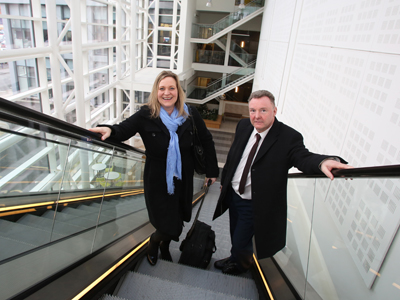
Sarah Urding, Gary Lamb and Paula Thomson-Jones glance at each other. Their eyes connect and all three start laughing.
I’ve just asked them what their former social work colleagues said when they revealed they were joining Ofsted.
“It was referred to as going to the dark side,” Thomson-Jones admits after the fit of giggles passes. “But they were supportive once the shock was over. A lot said they were pleased there were people who had very recent experience of managing services moving into Ofsted.”
It was referred to as going to the dark side
Urding, Lamb and Thomson-Jones are Her Majesty’s Inspectors (HMIs), the inspectors who assess the quality of children’s social care in local authorities, and their reasons for joining Ofsted are the same: the chance to make a difference.
“Ofsted was starting to talk about doing improvement work with local authorities and I had done a lot of improvement work in the local authority I had been working in so I thought this would be an opportunity to do it on a wider scale,” says Thomson-Jones, who joined Ofsted last June. “In a local authority you only have an impact on one place, but with Ofsted you’ve got the potential to have an impact on a much wider scale.”
Making a difference
Urding agrees. “I always wanted to make more of a difference and impact, not just on an individual child, but on services as a whole and national policy as well.”
The belief that you can deliver wider change through Ofsted than in a local authority pervades the organisation, they argue. “We can affect more change, more quickly,” says regulatory inspection manager Gary Balcombe. “If you’re a frontline social worker you’ve got a caseload, but here you are affecting hundreds, potentially thousands, of children with the direct work you do with providers and local authorities.”
Senior HMI Simon Rushall concurs: “You make a difference when you go in and say this is really good because that’s uplifting for the staff. And when you go in and find something that’s not very good then, because of our findings, things do change.”
Stress of inspection
While Ofsted can encourage improvements, the group acknowledges inspections induce anxiety for those under the microscope.
“You do need to recognise the impact your arrival has and minimise the stress as much as you can,” says HMI Helen Humphreys.
“It always works best when you reach an agreement with someone. So you can say, ‘I can’t find the care plans in this file. Can you?’ They say no, so I say ‘are we agreed there is no care plan on this file?’. That can be done courteously and helpfully without having to rub their noses in that. You don’t need to reinforce the fact that the care plans are missing, but you need to make it clear it is a regulatory failing and therefore we will need to take some action.”
“I can still remember being inspected very clearly from when I was in a local authority – you never forget it,” says senior HMI Chris Williams. “We are mindful of that and we do understand how it is for people and the pressure. What you see is an inspector coming in and having a meeting or similar, but what you don’t see – what I didn’t see when I was in a local authority – is all the work that goes on behind.”
Debate
This includes the long meetings where inspectors debate their findings. “People would be surprised about the level of challenge that goes on in the inspection team,” says Rushall. “The teams are really tough on each other. It’s ‘hang on a minute, that’s not stacking up with what I’m finding’, ‘Ok, let’s look at that’. There is a constant re-evaluation of the evidence.”
The ultimate goal, says Lamb, is to come away with the right assessment: “All we want is the inspection reports we produce to be an accurate reflection whether that’s inadequate or outstanding. For us it’s about making sure it’s the right picture. We want kids to get a good deal and don’t want them to get a raw deal.”
Ofsted is often accused of going out of its way to find fault, but the inspectors deny this is the case. “We feel a buzz when we see really good stuff,” says Rushall. “We do not want to go out and find places to be inadequate. We have to be tough because that’s the only way of improving standards but we do not go out trying to find places inadequate, just as social workers do not go out looking for reasons to take children into care.”
First duty is to the safety of children
Inspectors also take into account the budget and caseload pressures on the services they inspect, he adds: “We’ve always taken into account the context of a particular area. We know times are very hard in the public sector generally.
“But if we find things that are unsafe we will say that, no matter what, because that is our first duty. We are aware of the context but standards still have to be at the right level.”
Besides, says Thomson-Jones, lower budgets do not always mean poorer outcomes for children. “Organisational conditions are very challenging at the moment but our experience as we move around the country is that some authorities are doing things really well with minimal resources because of the way they have managed, organised and structured themselves,” she says.
“Huge organisations with loads of resources do not necessarily have the best outcomes for children. Those two things do not necessarily correlate.”
Being an inspector is a lot like being a social worker
The need to work with providers while still pulling them up on shortcomings means that being an Ofsted inspector is a lot like being a social worker says Rushall. “It’s very similar to what a social worker does with a family because you have to challenge and you have to support. When I joined Ofsted I was really struck by the similarities. We’re honest with them; we’re direct with them. They might not like it but we work from a position of good, hard evidence. And they get it. Even good authorities will ask which areas are doing this particular element better than they are.”
Ofsted’s role in offering advice on how to improve to services is another aspect of its work those on the receiving end of inspections might be unaware of, says Williams.
Improvement role
“We inspect nationally and that means we go everywhere. We have all this intelligence so we must know what works well and how we can help,” she says. “So we present all the research that’s come through our own findings and that’s often more up to date than research that’s just been published but has been done two to three years ago. We can tell you what’s happened in the last six to 12 months and some of our thematic inspections tell you so much more.”
It’s an area Ofsted is ramping up, adds regulatory inspection manager Stella Elliott: “I’m conscious that most children’s homes, for example, want to do a really good job and they struggle with finding the right calibre of staff, recruitment, retention, training, etc. We have started this process now of meeting local provider groups and we have a lead with each of the larger providers and help them on their improvement journey. I think that’s a really good step.”
And it’s seeing these improvements on the ground that makes Ofsted inspectors happy.
Sense of fulfilment
“I like seeing services that are good and striving for excellence,” says Lamb. “And – equally – when places are inadequate and we’ve gone back and seen the improvements I really feel a sense of fulfilment. I know I haven’t done the work directly, but the people we’ve inspected have benefited greatly from that in their delivery and the improvements for children and families.”
Social care regulatory inspector Rachel Griffiths agrees: “The best bit is when you see really outstanding practice. When you see a young person who has been missing from home on and off for months and months who regularly self harms and has been exploited. Then you speak to that young person six months down the line after being in a home where lots of really excellent work is being undertaken and they say that living here has changed my life.
That’s just the most rewarding thing to hear.”
Social care regulatory inspectors Regulatory inspectors, who usually work alone, assess the work of children’s homes, residential family centres, residential special schools, fostering and adoption services, and other social care settings. They also make decisions about what action to take when providers are not complying with legislation. They report to regulatory inspection managers (RIMs) who oversee regulatory inspections across the eight regions of England.
Her Majesty’s inspectors These Ofsted inspectors usually work in teams to examine the work of local authorities and Cafcass and lead on the improvement work with some of those services that Ofsted has inspected. They report to senior HMIs who quality assure their work.








 Bournemouth, Christchurch and Poole
Bournemouth, Christchurch and Poole  Hampshire County Council
Hampshire County Council  Lincolnshire County Council
Lincolnshire County Council  Norfolk County Council
Norfolk County Council  Northamptonshire Children’s Trust
Northamptonshire Children’s Trust  South Gloucestershire Council
South Gloucestershire Council  Wiltshire Council
Wiltshire Council  Wokingham Borough Council
Wokingham Borough Council  Children and young people with SEND are ‘valued and prioritised’ in Wiltshire, find inspectors
Children and young people with SEND are ‘valued and prioritised’ in Wiltshire, find inspectors  How specialist refugee teams benefit young people and social workers
How specialist refugee teams benefit young people and social workers  Podcast: returning to social work after becoming a first-time parent
Podcast: returning to social work after becoming a first-time parent  Podcast: would you work for an inadequate-rated service?
Podcast: would you work for an inadequate-rated service?  Family help: one local authority’s experience of the model
Family help: one local authority’s experience of the model  Workforce Insights – showcasing a selection of the sector’s top recruiters
Workforce Insights – showcasing a selection of the sector’s top recruiters 

 Facebook
Facebook X
X LinkedIn
LinkedIn Instagram
Instagram
Ofsted the best PR in the business!! Teflon coated through and through. 30% cut in childrens services and a doubling of caseload no problem!!
Good grief what planet are these people on!